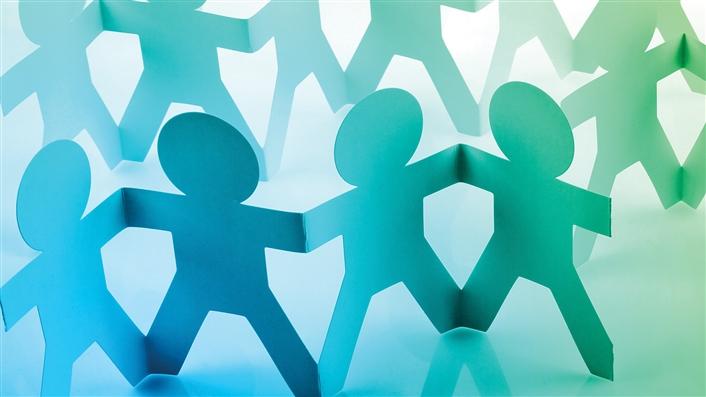The strength of the EDUCAUSE community is not that we have so much in common but, rather, that we bring together and celebrate so many different ideas and perspectives.

I grew up in the Midwest, where raising your voice is generally avoided and where the word interesting can amount to a withering critique (as in, "That outfit is interesting").1 While I practiced the unspoken rules of the Midwest, in my small town there was one family I secretly admired. Their sprawling, chaotic house was always lively, filled with people who held strong opinions, who talked loudly, and who used lots of reckless shoulder-level gesturing.
Early on I learned the value of both quiet and animated conversation. So the fact that you can find both at the EDUCAUSE Annual Conference is one reason I eagerly look forward to coming together every year. Conference attendees can design their own conference experience, focusing on curated sessions, on one-on-one networking, or on quiet conversations—or on scrappier conversations in the more boisterous exhibit hall. The annual conference reflects the great variety of ideas and people in our thriving community.
A powerful sense of community is evident everywhere at this conference and especially at the heart of the conference space, where "community hubs" create unique spaces for gathering. "Meet and Mingle" opportunities are designed for connecting with EDUCAUSE staff and with peers. Conference attendees can enjoy beverages and can use the "Work and Chat" spaces to host a pop-up business meeting, join a conference call, or catch up on e-mail. Since conference days can be long, the "Relax and Renew" spaces allow attendees to take a break and recharge with the help of relaxing virtual reality, aromatherapy, and massage options.
For those who love to hear general session speakers (e.g., Michele Norris and Alexis Ohanian) and featured session speakers, there are more opportunities than ever this year. On the second day of the conference, we've replaced a single general session with a handful of great speakers such as Teddy Benson and Marina Gorbis.
This year we are also excited to introduce braindates. Accessed through the EDUCAUSE mobile app, braindates are structured opportunities for conference participants to connect with one or a few peers on topics of mutual interest. These social activities offer a new way to further extend our community through meaningful peer-to-peer connections and learning opportunities.
Of course, this mix of ways to engage with others in the community doesn't start or end with the annual conference or any other single EDUCAUSE event. To help connect members to EDUCAUSE resources throughout the year, we've created the EDUCAUSE Ambassador Program. Ambassadors get access to curated EDUCAUSE content to help them (and their organizations) address the challenges they face. Sharing these resources with colleagues allows Ambassadors to increase their interaction with peers across departments and improve their visibility at their institutions while building connections and collaborating with Ambassadors at other institutions. We also offer Ambassadors the opportunity to participate in periodic calls with the EDUCAUSE programs and services teams to get their questions answered and help shape the future of association offerings.
This Ambassador Program is intended to build community connections. In addition, it is a remarkable example of how our community innovates. When I began service as EDUCAUSE president in 2015, one of the most consistent messages I heard was that younger IT professionals wanted to be more active in EDUCAUSE but didn't know how to do so. I created the Young Professionals Advisory Committee (YPAC) not just to give these valuable members of our community a venue to get a closer look at EDUCAUSE but also, and more importantly, to give EDUCAUSE a venue to listen to their insights and make our association better for having listened. At YPAC meetings, leaders from EDUCAUSE program areas share what they are doing and brainstorm about what could be done differently and better. From one of these conversations, the Ambassador Program was born. As YPAC Chair Tina Pappas, assistant director at Rutgers University, says, "The Young Professionals Advisory Committee includes folks from a very broad cross-section of technology fields, but the one thing we have in common is a willingness to ask questions and think creatively—and the Ambassador Program is just one example of that."
Giving voice to the depth and breadth of our remarkable community is crucial. Michele Norin, Rutgers CIO and vice chair of the EDUCAUSE board of directors, acknowledges the value of this kind of deliberate community engagement: "EDUCAUSE will continue to serve our community well if it is intentional about listening—and especially listening to the voices that have been quiet and haven't always been heard." Along with listening to young professionals, EDUCAUSE staff is continuing intentional work to promote diversity, equity, and inclusion (DEI) across our community. At the annual conference this year, members will have many opportunities to explore this important topic and can also sign on to the new "EDUCAUSE CIO Commitment Statement," originally conceived by Texas Woman's University CIO Raechelle Clemmons, a member of the EDUCAUSE DEI Task Force.
The exemplary IT professionals working in higher education could very likely bring home bigger paychecks working in industries outside higher education. Why do they stay? Often it is because there is simply no better place to work, learn, and thrive than in higher education. The strength of the EDUCAUSE community is not that we have so much in common but, rather, that we bring together and celebrate so many different ideas and perspectives.

Note
- For example, see Howard Mohr's video "How To Talk Minnesotan: The Power of Negative" [https://www.youtube.com/watch?v=3c-3C2z2zxw] (1993), based on his book of the same name. ↩
John O'Brien is President and CEO of EDUCAUSE.
© 2018 John O'Brien. The text of this article is licensed under the Creative Commons Attribution-NonCommercial-NoDerivatives 4.0 International License.
EDUCAUSE Review 53, no. 6 (November/December 2018)
